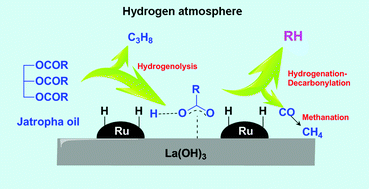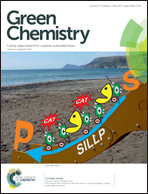Catalytic conversion of Jatropha oil to alkanes under mild conditions with a Ru/La(OH)3 catalyst†
Abstract
The long-chain alkanes obtained from the hydrodeoxygenation of plant oils are ideal substitutes for diesel. In this work, a new efficient catalytic system was established for the conversion of plant oil to long-chain alkanes under mild conditions with a bi-functional Ru/La(OH)3 catalyst. The hydrodeoxygenation of stearic acid was performed in an autoclave with Ru-based catalysts with different supports (HZSM-5, ZSM-5, SiO2–Al2O3, SiO2, ZrO2, Mg(OH)2, La(OH)3, and La2O3). Among these catalysts, Ru supported on basic La(OH)3 showed a remarkable catalytic performance for the reaction. Over 98% of long-chain alkanes were obtained with 100% conversion of stearic acid at 200 °C and 4 MPa H2. When crude Jatropha oil was hydrogenated, about 80.7 wt% of long chain alkanes were obtained under the optimized conditions (200 °C, 4 MPa H2, 8 h). The high efficiency of the Ru/La(OH)3 catalyst could be due to a co-effect of the high hydrogenation activity of Ru and the basic La(OH)3 support which can attract the acidic raw material. Additionally, the Ru/La(OH)3 catalyst was recycled four times and maintained a good activity and stability. The reaction pathway was also explored by using stearic acid as a model compound. Hydrogenation–decarbonylation could be the main pathway to produce n-heptadecane, which has one carbon atom less than stearic acid.


 Please wait while we load your content...
Please wait while we load your content...